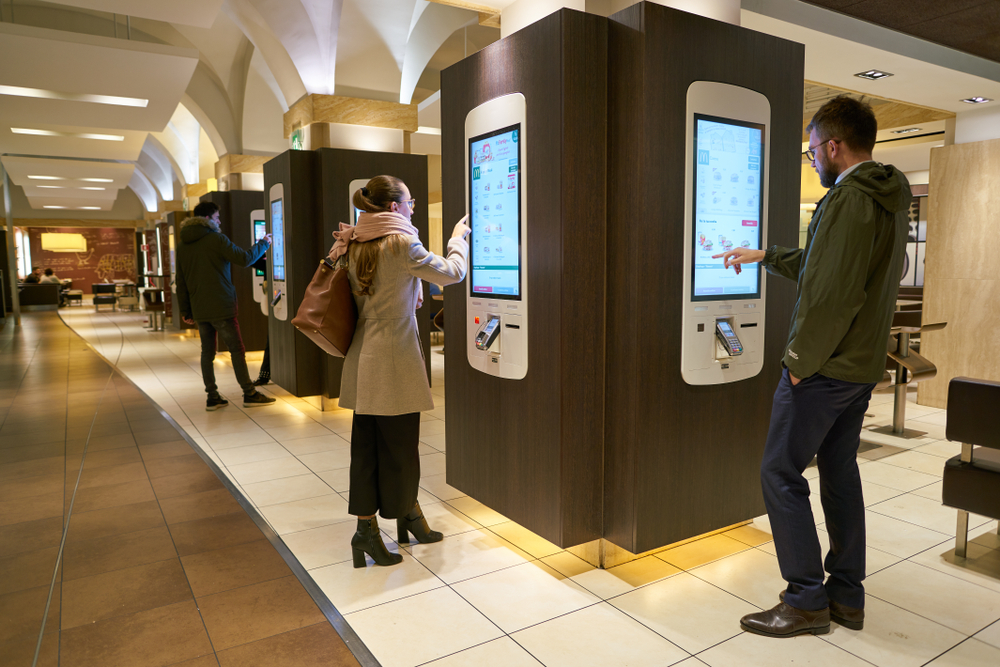Self-service kiosks are one of the major growth trends in POS solutions. Over the next decade, the number of businesses deploying kiosks is set to accelerate rapidly, with the market forecast to grow at a double-digit CAGR.
Everyone else seems to be rolling out kiosks. But are they right for your business?
Benefits of Self-Service Kiosks
The benefits of self-service kiosks centre on creating an improved customer experience, but also increased efficiency and therefore profitability.
For example, in sectors like quick-service restaurants (QSRs), kiosks have been shown to reduce waiting times and lead to faster service. Not only does this provide a better experience to customers, it also means more transactions can be processed.
Other CX benefits include the fact that self-service gives customers increased control over transactions, along with privacy and anonymity. Again in the QSR sector, it has been shown that people take more time over their orders at a kiosk, despite reduced wait times overall, This results in more order customization, but also more up- and cross-selling, which boosts average order values.
Which Industries Are Using Kiosks?
Self-service kiosks shine in businesses that deal with high customer volumes, repetitive transactions, and a focus on efficiency. Here are some of the best fits:
- Food Service: As mentioned, QSRs use kiosks extensively for order placement and payment. This allows customers to customize orders easily and reduces wait times during peak hours.
- Retail: Self-checkout lanes are now commonplace in large grocery stores and supermarkets. But other retailers use kiosks for information and service-related tasks like price checks and to look up product information. This frees up staff to assist customers with more complex needs.
- Travel & Hospitality: Airports, train stations, and hotels leverage kiosks for self-check-in, ticket printing, and flight information displays. This streamlines the customer journey and reduces pressure on staff during busy travel periods.
- Entertainment: Cinemas and other leisure venues often use kiosks for ticket purchases, seat selection, and even concession stand orders. This allows for faster entry and reduces queues.
- Banking & Finance: ATMs are the classic example of self-service kiosks, allowing basic banking transactions like cash withdrawals and balance inquiries without queueing to speak to a teller. Some banks offer more advanced services through in-branch kiosks.
- Healthcare: Kiosks are now widely found in hospitals and clinics where they are used for patient check-in, appointment scheduling, and even basic symptom assessment.
- Government Services: Kiosks can streamline processes like license renewals, permit applications, and benefit applications.
Deciding If Kiosks Are Right For You
Just because competitors are using kiosks doesn’t necessarily mean they’re the right fit for you. No, you don’t want to get left behind. But as with any tech investment, the bigger picture is making a positive difference to your business.
Here are some things to think about before deciding to introduce kiosks.
- Consider your business type: Are kiosks well-suited to your product or service offerings (e.g. ordering food vs. complex financial products where there is a lot of paperwork to read through)?
- Evaluate your customer demographics: Will your target audience be comfortable using kiosks?
- Analyze staffing needs: Can kiosks effectively free up employees for higher-value interactions?
- Calculate potential ROI: Weigh the cost of implementation against the expected benefits. Can you quantify the potential returns accurately?
The key to kiosk effectiveness is ensuring there is a good fit between the technology and the task. If the transaction is simple and customers are comfortable with technology, kiosks can significantly improve efficiency and customer satisfaction.

